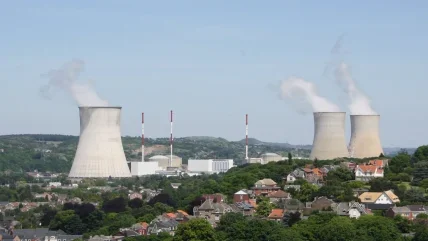
The European Commission (EC) has approved Belgium’s revised state aid measure to extend the operational lifetime of the Doel 4 and Tihange 3 nuclear reactors in the country by an additional 10 years.
The Doel 4 and the Tihange 3 reactors, which began operations in 1985, were originally designed for a 40-year lifespan. The Doel 4 reactor is located near Antwerp, while the Tihange 3 plant is situated southwest of Liège.
Both reactors have similar electricity generation capacities of nearly 1GW.
The EC’s approval follows an in-depth investigation assessing the necessity, proportionality, and market impact of the support scheme under the European Union (EU) State aid rules.
Belgium’s 2003 nuclear phase-out law originally required the closure of all seven of its nuclear reactors by 2025.
However, in response to energy security concerns and Russia’s military attack on Ukraine, the Belgian government decided in March 2022 to keep the two newest reactors operational for another 10 years.
In June 2024, Belgium conveyed its plan to the EC of providing financial support for the extension of the two reactors, covering electricity generation of up to 2GW.
The Commission launched an in-depth investigation on 22 July 2024 to examine concerns over the design of the contract-for-difference (CfD) scheme, the proportionality of financial arrangements, and the extent of nuclear waste liability transferred to the state.
The main beneficiaries of the Belgian aid are Engie’s subsidiary Electrabel and EDF’s subsidiary Luminus, along with BE-NUC, a newly established joint venture between the Belgian state and Electrabel.
Following the Belgian state’s aid, BE-NUC will hold an 89.8% stake in the two reactors, while Luminus will retain a 10.2% share.
The approved support package consists of financial and structural measures.
It also includes the transfer of nuclear waste liabilities from Electrabel to the Belgian state for a lump sum payment of €15bn as well as risk-sharing mechanisms and legal protections in case of future regulatory changes affecting nuclear operators.
The Commission assessed the measure under Article 107(3)(c) of the Treaty on the Functioning of the European Union (TFEU) and the updated EU electricity market design regulation (Regulation 2024/1747).
Belgium addressed concerns by modifying aspects of the support scheme, including the transfer of decision-making on economic modulations from BE-NUC to an independent energy manager to ensure competitive electricity trading.
Following the modifications, the Commission concluded that the aid was necessary, proportionate, and in line with EU competition rules, ensuring that market distortions were minimised.






